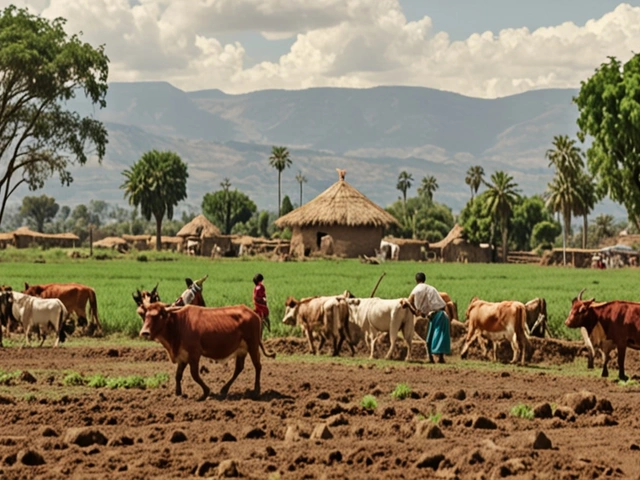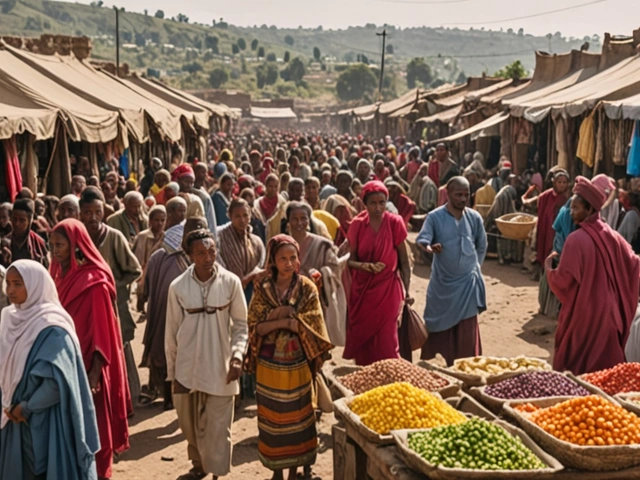When you think of Ethiopia, images of vibrant cultural traditions and awe-inspiring landscapes might come to mind. Yet, beneath this rich tapestry of heritage and history, lies a nation ripe with economic potential and a growing roster of millionaires.
In recent years, Ethiopia has emerged as one of Africa's fastest-growing economies. With a rising middle class and a dynamic business environment, the country is increasingly seen as a place where dreams of wealth can become a reality. This isn't just a tale spun by the media; it's a lived experience for many industrious Ethiopians who have carved out substantial fortunes through innovation, resilience, and hard work.
The journey to becoming a millionaire in Ethiopia often involves navigating both age-old traditions and modern business practices. This article delves into the economic opportunities within Ethiopia, shares stories of those who've achieved great financial success, and uncovers the sectors with the most promise for aspiring tycoons.
- Economic Landscape of Ethiopia
- Successful Millionaire Examples
- Industries with Potential
- Entrepreneurial Strategies
- Challenges and Opportunities
- Future Prospects for Wealth Building
Economic Landscape of Ethiopia
The economic landscape of Ethiopia is a story of dynamic transformation and growth that captivates the imagination. Over the past decade, Ethiopia has consistently reported high GDP growth rates, making it one of the fastest-growing economies in Africa. This growth has been fueled by a combination of agricultural expansion, infrastructure developments, and government-led initiatives aimed at boosting industrialization. Agriculture remains a cornerstone of the Ethiopian economy, with coffee being the top export earner. Ethiopia is the birthplace of coffee, and its coffee beans are regarded worldwide for their unique flavors and high quality.
Manufacturing has also seen a significant rise, contributing to the economic tapestry of Ethiopia. The government, in its bid to industrialize, has established several industrial parks offering attractive incentives for investors. These parks are part of the 'Growth and Transformation Plan', a strategic initiative to turn Ethiopia into a manufacturing hub. Though challenges such as political instability and regional conflicts have posed hurdles, the resilience and ambition of the Ethiopian people continue to drive progress.
Ethiopia's ambitious industrialization plans have the potential to transform its economic trajectory, remarked an analyst from the International Monetary Fund (IMF).The vision is to create millions of jobs and enhance the living standards for all Ethiopians.
Another compelling aspect of Ethiopia's economy is the burgeoning tech scene. Addis Ababa, the capital city, is becoming a vibrant tech hub attracting startups and investors alike. Promising young entrepreneurs are leveraging technology to solve local challenges and tap into global markets. With initiatives focused on increasing internet penetration and digital literacy, the government acknowledges the transformative potential of technology for future growth. A rise in mobile phone usage and internet connectivity is unlocking new opportunities for digital businesses. This budding technology sector shows Ethiopia’s adaptability in the face of rapid technological changes, positioning it as a frontier for tech-driven wealth creation.
Successful Millionaire Examples
In a land often heralded for its stunning landscapes and ancient heritage, Ethiopia is also excelling in another arena — the creation of homegrown millionaires. These enterprising individuals are not merely products of happenstance but are architects of their destinies, crafting success stories that serve as inspiration across the continent. One such example is Mohammed Al Amoudi, an Ethiopian-Saudi billionaire, whose investments straddle both Ethiopia and the wider globe. With roots firmly planted in Ethiopia, Al Amoudi has built a diversified business empire encompassing construction, agriculture, and energy, thereby contributing significantly to Ethiopia's economy.
Another notable mention is the enchanting ascent of Bethlehem Tilahun Alemu. Her company, soleRebels, is a pioneering fair-trade fashion brand that has not only succeeded in reaching global markets but has also uplifted her community out of poverty by employing local artisans. Bethlehem’s success lies in her unique business model which combines sustainable practices with modern retail strategies, marking her as one of the influential Ethiopian business leaders. As she once said, "We are not just creating a fashion brand; we are building a community." Her journey is a testament to how traditional crafts can form the backbone of modern entrepreneurship.
A different narrative is offered by Ermyas Amelga, the visionary behind Access Real Estate. Unlike many, Amelga ventured into the real estate sector, responding to Ethiopia's urbanization needs. Despite various challenges, his firm stride in this sector illustrates the potential within Ethiopia’s growing cities. His ability to foresee urban housing demands has sparked a wave of investments in this sector and reinforced the role of real estate in wealth accumulation. The growth of the Ethiopian housing market is indicative of broader economic development, highlighting the importance of infrastructure in millionaire-making stories.
Ethiopia’s burgeoning tech industry cannot be overlooked in discussions of wealth. The likes of Amadou Daffe, co-founder of Gebeya, a talent marketplace empowering African tech professionals, symbolizes the new wave of digital entrepreneurs riding the tech boom. His firm provides skill development and creates employment opportunities, showing how the digital realm can pave a millionaire's path. Opportunities in tech echo globally, but in Ethiopia, it’s transforming traditional concepts of business into cutting-edge innovations.
Finally, the agricultural entrepreneur, Haile Gebrselassie, a former athlete turned businessman, stands out. After a successful career as a runner, Haile transitioned to agriculture, investing in coffee farming — Ethiopia’s emblematic sector. His ventures enhance agricultural productivity while promoting Ethiopia’s coffee as a premium product on the world stage. By highlighting local resources and focusing on quality, Haile not only grows wealth personally but also champions Ethiopia’s agricultural potential. His multidisciplinary approach showcases how diverse fields in Ethiopia can serve as a ladder to financial success.
Ethiopian millionaires manifest the spirit of innovation and adaptation across diverse sectors, from traditional agriculture to modern tech, demonstrating the dynamic potential of the Ethiopian economy. Their stories offer valuable lessons in perseverance, vision, and strategic planning, epitomizing the pathways to building wealth in the heart of Africa.

Industries with Potential
In the heart of Ethiopia, the winds of change are blowing across various sectors, creating new avenues for wealth creation and financial prosperity. One of the most promising sectors contributing to the rise of Ethiopian millionaires is agriculture. Despite its ancient roots, agriculture is still very much the backbone of Ethiopia's economy, employing a significant portion of the population. This sector is not only about traditional farming; technological innovations are reshaping how farming is perceived and practiced. Imagine a world where drones map vast farmlands, ensuring optimal harvesting seasons, or mobile apps connect farmers directly with global markets, cutting out the middlemen and boosting profits.
Another burgeoning industry is the tech sector, which is particularly appealing to the younger generation of aspiring entrepreneurs. Addis Ababa, often referred to as the 'Silicon Valley of Africa', is the epicenter of tech innovation. Digital startups are emerging with rapid speed, offering everything from mobile banking solutions to e-commerce platforms tailored to local needs. With the internet reaching remote areas, these startups are bridging gaps and creating more wealth in Ethiopia than ever before. The driving force behind these changes is a youthful population that is tech-savvy, ambitious, and eager to make their mark on the world. A testament to the potential of this sector, a local tech company recently secured millions in foreign investment, showcasing the global interest in Ethiopian innovation.
The textile and fashion industry has also seen a remarkable revival. Ethiopia is known for its rich tapestry of fabrics and designs that have captured international attention. Local designers are gaining prominence, melding traditional Ethiopian patterns with contemporary styles, and exporting their creations to fashion capitals around the world. This resurgence is part of a broader movement to promote 'Made in Ethiopia' as a quality mark, much like 'Made in Italy' or 'Made in France'. Such initiatives open extensive revenue streams not just within the country but on the global stage, positioning Ethiopian businesses to compete in international markets.
A World Bank report noted, "Ethiopia's rapid economic growth and development prospects make it a promising destination for investors exploring new industries."
Tourism is a perennial industry with opportunities that continue to expand. From alluring historical sites such as Lalibela's rock-hewn churches to the mesmerizing landscapes of the Simien Mountains, Ethiopia's tourism potential is immense. Entrepreneurs are investing in eco-friendly lodges and cultural experiences that provide meaningful employment to local communities, ensuring that growth benefits everyone, not just the elite. As global travel recovers, there's a growing trend towards more sustainable tourism practices, making Ethiopia's natural and cultural offerings particularly appealing.
Lastly, the energy sector cannot be overlooked. With the government prioritizing renewable energy, there's a surge in solar and wind projects. The Grand Ethiopian Renaissance Dam, a colossal hydroelectric project, embodies one of the largest opportunities in Africa's energy sector. Not only does it promise to electrify rural Ethiopia, enhancing life quality and economic participation, but it also positions the country as a principal energy supplier in the region. It reflects Ethiopia’s determination to harness its natural resources responsibly and takes a giant stride towards industrialization, which could see domestic and foreign players hauling in substantial financial gains.
Entrepreneurial Strategies
Entrepreneurship in Ethiopia is like an art form with multiple layers of tradition, innovation, and unyielding ambition coming together. To thrive in this vibrant market, aspiring millionaires must develop a keen sense of strategy and adaptability. It's not just about having a lucrative idea; it's about maneuvering through the country's economic landscape with both foresight and insight. Many successful Ethiopian entrepreneurs advocate for leveraging local resources and traditions while coupling them with modern business practices.
A good starting point is to identify the niche markets that are on the rise in Ethiopia. From agriculture to technology, these sectors offer immense potential for wealth creation. The agricultural industry, for instance, remains a cornerstone of the Ethiopian economy, with opportunities in coffee exports and new-age organic farming. Meanwhile, the tech scene is booming, with young entrepreneurs launching innovative startups that cater to an ever-increasing demand for digital solutions.
Networking also plays a vital role in building a successful business in Ethiopia. By building strong relationships with industry leaders and community members, entrepreneurs can access insights and resources that fuel growth. Attending industry conferences and events, even participating in informal community gatherings, can open doors to partnerships and collaborations that propel an enterprise forward. Building a trustworthy and capable team cannot be overstated, as every successful entrepreneur will attest to the power of cohesive teamwork.
Capital remains a critical aspect, and accessing it can sometimes be challenging. Yet, Ethiopian entrepreneurs like Bethlehem Tilahun Alemu, founder of the world-renowned brand SoleRebels, have shown resilience in raising funds both locally and internationally. Microloans and venture capital are avenues often explored alongside traditional bank loans. Government incentives for startups and foreign investments have also been instrumental in easing some financial burdens for business starters.
Above all, embracing a risk-taking mindset is crucial. Ethiopian millionaires often recount tales of taking plunges into the unknown, seizing opportunities even when the odds seemed unfavorable. They blend patience with aggression, knowing when to push hard and when to hold back. A quote from Aliko Dangote, Africa’s richest man, captures this spirit succinctly:
"In business, you need to know what you want, and you need to be patient, but you also need to be aggressive when the time comes."Aspiring entrepreneurs in Ethiopia can take this to heart as they embark on their journeys.
Entrepreneurship in Ethiopia is set on a unique backdrop of cultural richness and economic potential. Adopting these strategies can make the path to joining the ranks of Ethiopian millionaires less daunting and more achievable. Those who rise to the challenge are not only realizing personal success but are also contributing to the country's burgeoning economy, paving the way for the next generation of entrepreneurs.

Challenges and Opportunities
In Ethiopia, the road to becoming one of the country's top Ethiopian millionaires is marked by both formidable challenges and abundant opportunities. For a nation steeped in history, the landscape of wealth creation is continually evolving. The country’s economy has been predominantly agrarian, with agriculture still playing a pivotal role. Yet, even in this traditional sector, innovative practices have opened new doors. Barriers such as outdated farming techniques, limited access to technology, or threats from climate change impose significant hurdles. However, those who can harness modern agricultural technology often find themselves reaping remarkable rewards, tapping into both local and international markets.
One of the significant challenges faced by budding entrepreneurs is access to capital. Many aspiring business owners encounter difficulties in securing loans due to underdeveloped financial services or high-interest rates, which can stifle innovation and growth. Yet, governmental and international efforts have aimed to improve this situation by injecting funds into microfinance initiatives and encouraging the establishment of venture capital firms. As more Ethiopians gain access to these resources, new businesses and innovative startups can flourish, leading to a thriving economy open to more wealth creation opportunities.
Moreover, the burgeoning tech industry presents a realm of untapped potential. Tech startup scenes in cities like Addis Ababa are buzzing with activity, supported by a youthful populace eager to embrace digital transformation. Government projects like the "Digital Ethiopia 2025" initiative are paving the way to higher internet penetration and improved tech infrastructure, thus enabling entrepreneurs to take giant strides toward prosperity. Yet, it is critical to acknowledge that challenges remain, including the widespread need for skills development and the enhancement of digital literacy.
"Ethiopia represents a land of possibility for those with the vision to see it," stated Abiy Ahmed, the Prime Minister, at a recent conference focusing on entrepreneurial growth in the region.
The retail and real estate sectors also hold promise. Ethiopia's urbanizing population has led to an increased demand for housing and consumer goods, indicating ripe opportunities for savvy investors. However, factors such as bureaucratic regulations and land tenure issues can pose difficulties. Navigating these can often require patience and perseverance but can be highly rewarding for those who manage to do so.
Finally, education and skill development remain both a challenge and an opportunity. The burgeoning population of young people is a testament to Ethiopia’s potential, provided that there are adequate educational infrastructures to foster their talents. This youthful energy represents a vast pool of untapped potential that could drive economic growth, provided they are equipped with the necessary skills to innovate and lead in various industries. As Ethiopia continues to invest in educating its youth, both through traditional schooling and vocational training programs, the nation sets its sights on a promising future where wealth is not just concentrated but widespread.
Future Prospects for Wealth Building
The momentum of economic development in Ethiopia is opening up numerous avenues for wealth accumulation, pointing to a future ripe with opportunity. As the country's economy diversifies beyond traditional sectors like agriculture and textiles, new industries are beginning to shine. The tech scene in Ethiopia, for instance, is a burgeoning hub of innovation, attracting both local talent and foreign investment. This shift is partly driven by the government's commitment to supporting digital infrastructure and fostering a tech-savvy workforce.
Consider the potential in the agricultural sector, which has always been the backbone of Ethiopia's economy. As technology integrates into farming practices, including the use of data to optimize crop yields and reduce waste, the prospects for wealth creation within agriculture are expanding. Many young entrepreneurs are entering this field, combining traditional knowledge with modern techniques to revolutionize production and distribution networks.
Ethiopia's strategic location in East Africa also plays a key role in wealth-building prospects, acting as a gateway for trade within the African continent and beyond. The African Continental Free Trade Area (AfCFTA) is expected to enhance market access, enabling Ethiopian businesses to reach wider audiences and grow their operations. This creates a fertile ground for startups and established companies to explore niche markets, whether they're in manufacturing, services, or hospitality.
Investments and Infrastructure
Investments in infrastructure are pivotal to wealth creation. The Ethiopian government and international partners are investing heavily in roads, railways, and energy projects, improving connectivity within the country and the region. Such developments pave the way for more efficient business operations, reducing costs and improving delivery times. As more regions become accessible, there's potential for expanding businesses and tapping into new customer bases. Entrepreneurs keen on property development or logistics will find these changes especially advantageous.
The energy sector is another attractive prospect for those aiming to build wealth. Ethiopia has made significant strides in renewable energy, particularly hydroelectric power, which positions it as a regional leader. The focus on green energy aligns with global trends, offering investment opportunities in solar and wind power initiatives. The potential for exporting surplus energy to neighboring countries not only boosts national income but also opens doors for savvy business minds with an eye on sustainable growth.
"Ethiopia's economic transformation journey is inspiring, presenting a unique landscape for entrepreneurs and investors alike," notes Alemayehu Geda, a prominent economist.
With a young and dynamic population hungry for change and success, the entrepreneurial spirit in Ethiopia is vibrant. This demographic trend creates a reservoir of potential talent waiting to drive the next wave of innovative businesses. Leveraging education and vocational training will be crucial in nurturing this talent, ensuring that the workforce is equipped with the necessary skills to thrive and adapt in an evolving economic milieu.
For those interested in making money in Ethiopia, the key lies in recognizing opportunities where traditional markets and new innovations intersect. Whether it's through technology, sustainable agriculture, or capitalizing on Ethiopia's growing status as a trade hub, there are countless avenues for ambitious individuals to explore. With determination and strategic thinking, Ethiopia's future wealth builders can transform possibilities into tangible success stories.

 Exploring the Major Occupation in Ethiopia: The Agricultural Backbone
Exploring the Major Occupation in Ethiopia: The Agricultural Backbone
 English Teacher Salaries in Ethiopia: How Much Can You Earn?
English Teacher Salaries in Ethiopia: How Much Can You Earn?
 Understanding Cultural Etiquette: Respecting Traditions in Ethiopia
Understanding Cultural Etiquette: Respecting Traditions in Ethiopia
 Which Ethiopian Ethnic Group is the Richest? A Detailed Analysis
Which Ethiopian Ethnic Group is the Richest? A Detailed Analysis
 Most Common Jobs in Ethiopia Revealed
Most Common Jobs in Ethiopia Revealed
pradeep kumar
November 9, 2024 AT 16:52Ethiopia's hype ignores the real bottlenecks; without infrastructure reforms the millionaire narrative is a fantasy.
love monster
November 9, 2024 AT 17:17The sector breakdown you provided is solid, especially the emphasis on agritech and renewable energy. Those are the growth levers that can convert raw potential into scalable profit. Investors should watch the industrial parks and the upcoming solar farms to gauge where capital will flow next.
Christian Barthelt
November 9, 2024 AT 17:42While the article paints a rosy picture of Ethiopia's economic ascent, a deeper dive reveals a complex tapestry of structural challenges and untapped potential. First, the agricultural sector, despite being the backbone, suffers from fragmented land tenure, limiting economies of scale. Second, the nascent tech ecosystem grapples with insufficient broadband penetration, which hampers startup scalability. Third, access to credit remains constrained, as commercial banks impose high collateral requirements that deter budding entrepreneurs. Fourth, the regulatory environment, though improving, still presents opaque licensing procedures that can stall foreign investment. Fifth, human capital development lags behind demand, with a shortage of skilled engineers and managers to drive industrial projects. Sixth, macroeconomic volatility, including inflationary pressures, erodes profit margins and adds uncertainty to long‑term planning. Seventh, the geopolitical landscape, marked by regional tensions, can disrupt supply chains and deter trade. Eighth, the energy sector, while promising, is heavily dependent on a few mega‑projects, making the grid vulnerable to single‑point failures. Ninth, urban migration fuels housing demand but also strains municipal services, creating hidden costs for developers. Tenth, the tourism push must balance conservation with commercialization to avoid degrading the very attractions that draw visitors. Eleventh, the government's ambitious growth plans rely on sustained foreign direct investment, which can be fickle under global market shifts. Twelfth, cultural attitudes toward risk can limit entrepreneurial dynamism, especially in rural communities. Thirteenth, the legal framework for intellectual property protection remains underdeveloped, discouraging innovation‑heavy firms. Fourteenth, the lack of a robust venture capital ecosystem forces startups to seek early exits at suboptimal valuations. Finally, while the narrative of millionaires is inspiring, replication requires a systematic approach that addresses each of these interlocking factors. Ignoring any of them could transform optimism into missed opportunity.
Ify Okocha
November 9, 2024 AT 18:07The so‑called success stories are cherry‑picked anecdotes; most Ethiopian firms still battle cash‑flow crises and bureaucratic red tape. Ignoring these systemic flaws does a disservice to anyone looking for realistic wealth pathways.
William Anderson
November 9, 2024 AT 18:32Behold the grand tapestry of ambition, where every sunrise over the highlands heralds a new venture daring to defy the odds. Yet, beneath the poetry lies cold hard reality-capital scarcity, policy inertia, and a talent gap that gnaws at dreams. Only those who can wield both vision and ruthless execution will ascend the millionaire echelon. The rest, alas, become footnotes in the saga of unmet potential.
Sherri Gassaway
November 9, 2024 AT 18:57We must contemplate wealth not merely as currency but as a conduit for societal transformation. When prosperity aligns with cultural integrity, the ripple effects transcend individual benefit, fostering communal resilience. Thus, the pursuit of riches in Ethiopia can serve as a moral experiment in balancing profit and purpose.
Milo Cado
November 9, 2024 AT 19:22Keep pushing forward, the horizon of opportunity is widening every day 😊.